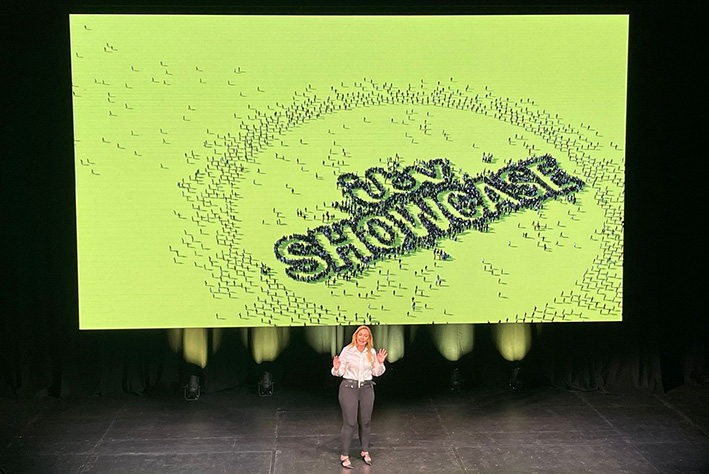ITV Showcase: Focus shifts to making TV ‘more accessible’

ITV, the UK’s biggest commercial broadcaster, used its annual Manchester event to highlight how it is making ITV accessible to all brands, whether those testing TV for the first time or scaling up.
The 12th ITV Showcase — a more commercially focused affair than its glitzy Palooza counterpart in December — was its biggest ever, attended by more than 500 representatives from agencies and advertisers.
This year’s event was hosted by This Morning guest presenter Josie Gibson, with a keynote from effectiveness guru Peter Field that centred on the four reasons why TV is at the heart of TV effectiveness. Director of client strategy and planning Kate Waters and measurement innovation lead, commercial, Sameer Modha presented latest ITV research.
Accompanying these updates were announcements for its H2 programming strategy across ITV and ITVX with ITVX editor Craig Morris, as well as presentations from managing director for commercial Kelly Williams and business development director Jason Spencer.
Williams opened proceedings, outlining the theme of the conference: “Effectiveness is the single most important thing about advertising and is our theme for today of making great things happen. We passionately believe that television continues to be, in fact, has always been the single most effective medium on the planet.”
In that vein, Spencer told delegates that its “our commitment to you” to make advertising on ITV “as accessible as possible”, and the broadcaster had developed multiple ways to make this happen.
Opportunities for smaller advertisers
Among opportunities available, or already taken up by smaller advertisers, ITV highlighted its fixed CPT packages for the Euro 2024 competition, which kicks off on Friday.
So far, 183 brands — 37 of which have never advertised around a major tournament with ITV — have taken up this deal.
Planet V, ITV’s self-service addressable advertising platform, recently hit £1bn in bookings and has welcomed 1,100 new brands to ITV since its launch in October 2020. In the past year, ITV’s streaming service, ITVX, reached 40m registered users and attracted more than 350 new brands.
ITV offers 10,000 data points on viewers for advertisers, while its total TV converged packages blend campaigns across spot and VOD advertising around shows like Love Island and Big Brother.
Another trend for smaller brands is growing interest in Be Studio, which has created 13 ad-funded series since its creation, with eight coming on air in H2. Judi Love is set to host a five-part ad-funded food and travel series, Judi Love’s Cruise Cookbook, by Emerald Cruises through the initiative.
Meanwhile, ITV’s measurement and innovation arm, ITV AdLabs, has carried out beta tests to “make innovation more affordable than ever”. For example, it is testing pause ads on ITVX for brands that only have static ad copy, with over half of those lasting longer than a minute.
The Diverse Audience Booster tool on ITVX, which launched in May, has “enabled more inclusive planning” to “balance” the reach of advertisers’ campaigns.
ITV also demonstrated case studies from brands including Shark Ninja, which has extended its headline sponsorship of This Morning; Heineken 0.0, which had a product placement deal across Coronation Street and Emmerdale; and PitPat, which advertised through its airtime-for-equity fund ITV AdVentures.
The heart of TV effectiveness
In his presentation, Peter Field built on what is behind TV’s effectiveness, and how it is relevant for modern brands.
He concluded TV’s power in advertising effectiveness was based on four things; very high sustained attention levels, being an entertaining medium where entertaining ads thrive, a safe and trustworthy medium, alongside exciting new technological opportunities with targeting and on-demand.
The latter he highlighted as particularly important for a small, start-up brand.
He concluded his talk by saying: “Without any hype, we can very confidently say TV has a unique ability to make great sales margin and therefore great profit and growth happen.”
In a session afterward, Spencer asked him how his research, which has used a lot of data from bigger brands and the IPA effectiveness databank, would apply to smaller brands who might be testing TV and scaling.
Field emphasised that TV has had “a dramatic transformative impact on start-ups” that “learn the need” to shift away from pure performance to brand building.
He added brands that needed to make the transition to size “reach a classic inflection point” that “a lot of start-ups miss”, where they need to start building brand before the value of performance marketing starts to “fall away quickly” .
Subsequently, he said that there were lots of ways to “dip your toe in the water with TV”, and address concerns around things like production costs that deter brands from trying it out, as well as regional testing and on-demand targeting to make sure brands have “access to TV for a less intimidating sum”.
“Of course, the trick here is to collect the data and make sure that the data is available so you can prove your point yourself and to your colleagues,” he said.
“The critical thing is to start the process before it’s too late of building your brand as a start-up and have a plan to build it out.”




